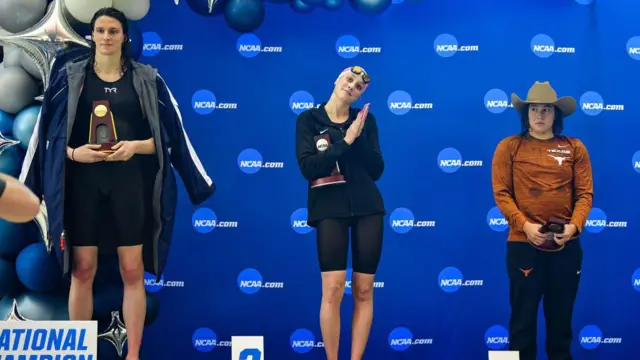Introduction: Lia Thomas, Title IX, and Trump’s Transgender Sports Policy

In a landmark decision tied to the national debate over transgender athletes in sports UPenn trans athlete ban, the University of Pennsylvania (UPenn) has agreed to prohibit transgender women from competing in women’s sports categories. This decision follows a civil rights investigation triggered by the participation of trans swimmer Lia Thomas, who won national championships in 2022 and shattered swim records.
The resolution comes amid a broader effort by the Trump administration to redefine athletic eligibility under Title IX, the federal law banning sex-based discrimination in educational institutions. The US Department of Education declared that UPenn would not only ban trans athletes in future competitions but also apologize to cisgender female athletes whose records were “misappropriated” under past policies.
UPenn’s Policy Shift: What Changes Now?

Under the terms of the federal agreement, UPenn must now comply with biology-based definitions of male and female, as mandated by President Trump’s executive orders on transgender participation in sports. UPenn will also update athletic records from the 2021–22 season to reflect outcomes as if the new eligibility rules were in place at the time—though the university did not specify whether Lia Thomas’ name would be removed.
In a statement, the university said its former policies had adhered to NCAA guidelines, but acknowledged that some student-athletes faced “competitive disadvantages.” The administration pledged to apologize to any athletes who felt harmed or excluded UPenn trans athlete ban.
Lia Thomas and the NCAA Legacy
Lia Thomas made headlines in March 2022 when she became the first transgender athlete to win a national collegiate title. She had competed for three years on UPenn’s men’s team before transitioning and beginning hormone replacement therapy in 2019.
Her victories sparked heated public debate and prompted conservative groups to lobby for changes in federal and university-level policies. In media interviews, Thomas said she transitioned “to be happy, to be true to myself,” rejecting accusations that her goal was competitive advantage.
The NCAA has stated that fewer than 10 transgender athletes are known to compete in college sports, underscoring how a small population has driven national legislation UPenn trans athlete ban.
Trump’s Role in Reshaping Title IX and Women’s Sports
This development marks another milestone in Donald Trump’s ongoing crackdown on transgender athletes. Days after taking office, he signed an executive order restricting trans women from female sports categories. His administration also paused $175 million in federal funding to UPenn due to alleged Title IX violations related to the inclusion of trans athletes.

US Education Secretary Linda McMahon said the new policy reflects the “Trump effect in action” and added, “Thanks to President Trump’s leadership, UPenn has agreed to ensure that women’s sports are protected for future generations.”
Mixed Reactions Across America
The decision has drawn sharp criticism from LGBTQ+ advocates UPenn trans athlete ban. The Human Rights Campaign called it a politically motivated attack on transgender students.
Spokesman Brandon Wolf stated, “Instead of focusing on improving education, this administration is obsessed with scapegoating transgender people.”
Meanwhile, conservative voices praised the decision. Legal analysts note that similar Title IX enforcement actions could follow at other universities with inclusive trans athlete policies, especially as the 2026 elections approach and the Trump campaign doubles down on culture war issues.
International Impact and Legal Precedents

Lia Thomas has already faced international restrictions. In 2023, the World Aquatics body voted to bar transgender women from elite events if they underwent male puberty. Thomas challenged the ruling, but the Court of Arbitration for Sport dismissed her case last year.
This ruling at UPenn aligns domestic collegiate sports more closely with those international bans, signaling a coordinated shift in global sports governance.
Conclusion: What Comes Next for Trans Athletes?
The UPenn decision is likely to influence future policies across American universities, potentially leading to further bans under the guise of Title IX enforcement. While Trump and his supporters frame it as a protection of fairness in women’s sports, critics argue it institutionalizes discrimination against a vulnerable minority.
The tension between inclusion and fairness in sports remains unresolved—and with Trump’s policy legacy now codified in educational mandates, the debate is far from over.
Stay updated on this developing issue at The Morning News Informer’s LGBTQ+ Rights section.










